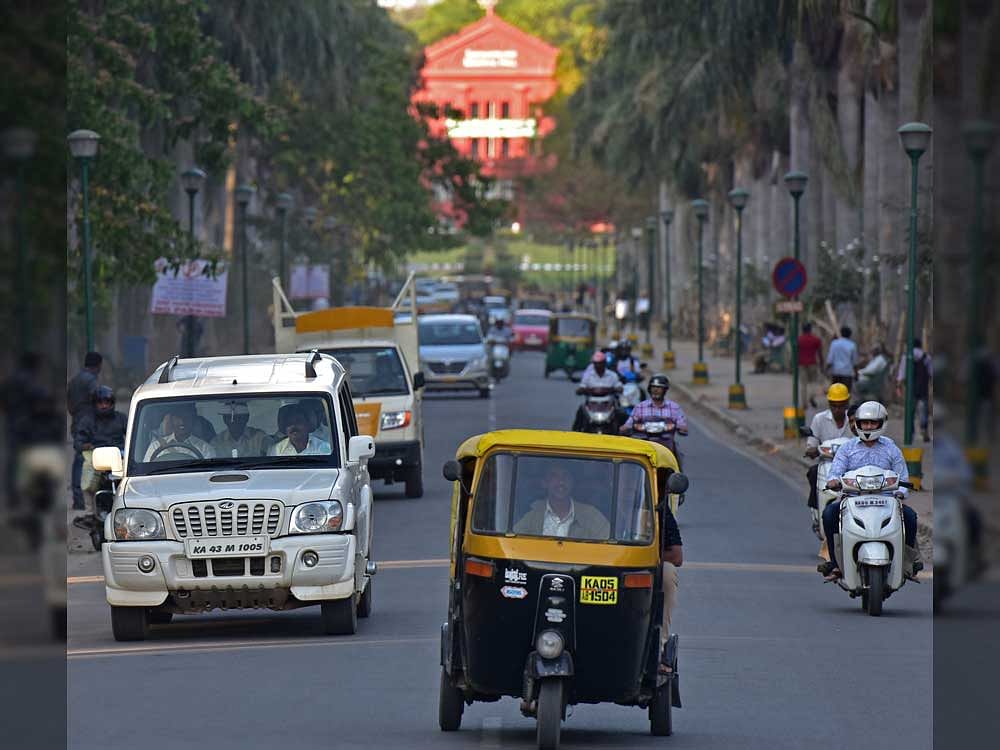Allowing vehicles in Cubbon Park on Sundays will increase pollutionOfficials cite study during traffic diversion from Nrupathunga Road
Last Updated IST

KSPCB officials point out that the pollution is high on the stretches around the State Central Library, Press Club, Century Club, Bal Bhavan, tennis club, road towards Cubbon Park police station and Visvesvaraya museum.
Bengaluru’s prime lung space is no green retreat for the gasping city’s residents. A recent study by the Karnataka State Pollution Control Board (KSPCB) shows that there is a rise in air and noise pollution in Cubbon Park due to increase in vehicular movement there.
KSPCB conducted the study when vehicles were diverted through Cubbon Park after Nrupathunga Road was closed for the TenderSURE project from March to May. KSPCB and Horticulture Department officials fear that if vehicles are permitted through the park on Sundays and on second Saturdays, pollution will further increase. They are waiting for the police commissioner’s office to strictly regulate traffic.
According to the study, the PM-10 levels on Sundays (March 11 and 12) was 92 µg/m3 while during weekdays (May 4 and 5), it was 71 µg/m3. The ambient noise pollution recorded on Sundays was 50.8 decibels against 46.1 decibels on working days.
“The values of fine dust particles (PM-10) increased on Sunday by 29% at Cubbon Park compared to working days. This is because of the increase in the number of vehicles. The noise pollution level increased on Sundays by 0.3% compared to working days during the same period. The average noise pollution in Cubbon Park has increased by 29.4%. It is also high around the High Court, which is supposed to be a silent zone,” the report states.
KSPCB officials point out that the pollution is high on the stretches around the State Central Library, Press Club, Century Club, Bal Bhavan, tennis club, road towards Cubbon Park police station and Visvesvaraya museum.
KSPCB chairman Lakshman said that if Cubbon Park’s gates are opened on second Saturdays and Sundays, then pollution data will again be checked and based on the findings, a report will be sent to the government.
S Umesh, president of Cubbon Park Walkers’ Association said that pollution is high because of increase in the number of vehicles and people’s movement inside the park.
The levels will increase if the gates are opened for vehicles on all days.
Ornithologists state that increase in air and noise pollution is detrimental to birds and bats. B Shivakumar, a bird watcher said that at any given time, one could count at least 255 bird species, but now 25 species have left the prime lung space.
KSPCB conducted the study when vehicles were diverted through Cubbon Park after Nrupathunga Road was closed for the TenderSURE project from March to May. KSPCB and Horticulture Department officials fear that if vehicles are permitted through the park on Sundays and on second Saturdays, pollution will further increase. They are waiting for the police commissioner’s office to strictly regulate traffic.
According to the study, the PM-10 levels on Sundays (March 11 and 12) was 92 µg/m3 while during weekdays (May 4 and 5), it was 71 µg/m3. The ambient noise pollution recorded on Sundays was 50.8 decibels against 46.1 decibels on working days.
“The values of fine dust particles (PM-10) increased on Sunday by 29% at Cubbon Park compared to working days. This is because of the increase in the number of vehicles. The noise pollution level increased on Sundays by 0.3% compared to working days during the same period. The average noise pollution in Cubbon Park has increased by 29.4%. It is also high around the High Court, which is supposed to be a silent zone,” the report states.
KSPCB officials point out that the pollution is high on the stretches around the State Central Library, Press Club, Century Club, Bal Bhavan, tennis club, road towards Cubbon Park police station and Visvesvaraya museum.
KSPCB chairman Lakshman said that if Cubbon Park’s gates are opened on second Saturdays and Sundays, then pollution data will again be checked and based on the findings, a report will be sent to the government.
S Umesh, president of Cubbon Park Walkers’ Association said that pollution is high because of increase in the number of vehicles and people’s movement inside the park.
The levels will increase if the gates are opened for vehicles on all days.
Ornithologists state that increase in air and noise pollution is detrimental to birds and bats. B Shivakumar, a bird watcher said that at any given time, one could count at least 255 bird species, but now 25 species have left the prime lung space.